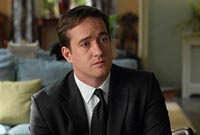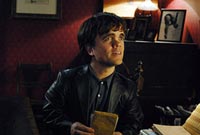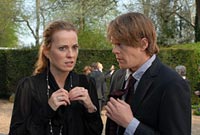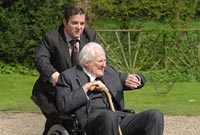The difference between British and American comedies is not so much a matter of content as it is a matter of delivery. American comedy tends to hit the audience over the head with the punchline; the Brits let the jokes fly more subtly and with little fanfare—forcing the audience to keep up. American comedies, like this summer’s Adam Sandler vehicle, I Now Pronounce You Chuck and Larry, typically create screwball situations and revel in crass buffoonery for its own sake. British comedies can be equally sophomoric and crude, but there is usually some larger satirical purpose or cultural commentary going on.
Such is the case with Death at a Funeral, a film that turns one of culture’s most sacred ceremonies into a circus of comedic insanity and fun British colloquialisms (“Art you mental?” is my favorite). It is just as bawdy and juvenile as any American comedy, yes; but it is also smart, subtle, and heartfelt—and this makes all the difference.

Funeral opens with an animated titles sequence that follows a cartoon hearse as it travels a winding path over a roadmap. When the hearse finally reaches its destination (a lovely country manor somewhere in rural Britain), Daniel (Matthew MacFadyen) solemnly watches as the casket of his dead father is unloaded and brought into the house where it will sit for a quiet family funeral. When the casket is opened, however, it turns out the wrong body has been brought! And so begins the barrage of mishaps, calamities, and unfortunate events that will make this simple, dignified occasion anything but.
Eventually the correct casket is delivered, and soon the house is invaded by dozens of guests, including family, friends, and a mysterious dwarf (Peter Dinklage) with an illicit secret. The largely British cast (led by British director Frank Oz, whose last film was 2004’s The Stepford Wives) works wonderfully as an ensemble, enlivening a diverse set of characters perfect for a film that revels in the juxtaposition of the demure (the matriarch of the family, played by Jane Asher) and the ridiculous (like “Uncle Alfie,” the elderly potty-mouth in a wheelchair, played with great fun by Peter Vaughn).

Stealing the film, however, is a non-Brit actor—Alan Tudyk (Knocked Up), who plays Simon, the hapless boyfriend of Martha (Daisy Donovan), niece of the deceased. On the way to the funeral they stop to pick up Martha’s stoner brother Troy, who has mislabeled bottles of hallucinogenic pills scattered around his flat. A nervous Simon opens a “Valium” bottle and takes a pill that turns out to be something altogether more whimsical than Valium. Hence Simon enters a trippy wonderland that won’t subside for eight hours. And of course, when acid trips meet decorous English funerals, hilarity is bound to ensue.
Like the Simon/drug trip storyline, each of the main characters is involved in one or more subplots that (of course) manage to intertwine by the film’s climax, which is truly hysterical (I’ve never been in a theater when so many people were screaming in laughter for five minutes straight). The structure of the movie feels almost like a Robert Altman film, with its “day in the life” observational feel. There are also issues of class tension, family dynamics, life, death, and sex that make this “world in a microcosm” film quite similar to something Altman would make.

Amidst all the slapstick mayhem and undignified absurdity, some interesting family and relational dynamics are explored. This includes the obvious examples: daughter and mother-in-law tension, father and soon-to-be son-in-law suspicion, and so on. The central relationship, however, is between Daniel and his brother Robert (Rupert Graves)—the two sons of the man for whose funeral they have gathered. There is ongoing tension between Daniel and Robert over a number of things, including finances (which brother will bear the cost of the funeral?), the eulogy (Daniel is planning to give it, even though everyone seems to be expecting Robert, “the writer,” to deliver some eloquent speech), and simple brotherly jealousy (Daniel is an aspiring novelist; Robert has already “made it”). There is also the matter of who will take care of Mum, now that Dad is gone. These sorts of issues provide the most realistic, relatable circumstances of the film.
Funeral doesn’t take itself all that seriously, and as such, its serious moments feel a little bit undermined or perhaps forced. After all, how serious can you get in a film that includes scatological humor (taken all the way to the toilet—literally), ubiquitous hallucinogenic craziness, and the token gay prison joke?

Even so, there is some heart to this film, mostly due to MacFadyen as Daniel, the straight-laced emotional centerpiece. The tall and stately MacFadyen brings the tender dignity of his most famous role (Mr. Darcy in 2005’s Pride & Prejudice) to his character in Funeral, reminding us that as bizarre and uncouth as the funeral for his father turned out to be, everyone is still there for a funeral—to honor an exceptional man’s memory.
When Daniel finally gets around to delivering the eulogy, it turns out to be a bit of poetry that evokes some Shakespearian soliloquy. “We do our best in a world of chaos,” Daniel says with heavy eyes, looking down at the casket of his father—who has very recently (thanks to the dwarf) been revealed to be a different man than anyone thought. “We live in a world where there are more questions than answers.”
Unfortunately, the Reverend (Thomas Wheatley) presiding over the funeral has no answers and is no consolation to the family; he seems most concerned that the whole ordeal be over by 3 p.m., when he must go to his next “appointment.” Certainly the portrayal of clergy—as well as the largely irreverent treatment of God and religion—belies the “spiritual” sentiment of the film, which seems to be characterized by the “life is chaos; we do our best” theme of Daniel’s eulogy. In the end, the movie seems to say, we only have each other to get us through the craziness of life.
Funeral is very funny and entertaining, a sometimes-dark comedy somewhere between Four Weddings and a Funeral and Meet the Parents. In the end it is a rather slight film, however, raising big issues and questions but leaving them largely unexplored. But its main point is to make us laugh, and on this count it succeeds, winningly.
Talk About It
Discussion starters- What, if anything, does the portrayal of the preacher say about the place of the church in the eyes of culture today?
- If a secret was posthumously revealed about your loved one that was as scandalous as the one revealed in this film, do you think you would want to know about it?
- What lessons do the characters learn as a result of the events of the funeral? And which character do you think grows the most during the course of the film?
The Family Corner
For parents to considerDeath at a Funeral is rated R mainly for language, including a lot of casual use of the f-word. There is also a running gag concerning hallucinogenic drugs, which are consumed by at least three characters (by accident). Other topics that make this a very adult-oriented film include allusions to an extra-marital homosexual affair, one-night stands, and casual drug use. There is no sex in the actual film, but there is an extended scene of rear male nudity (comedic). It’s definitely not for kids.
Photos © Copyright MGM
Copyright © 2007 Christianity Today. Click for reprint information.












